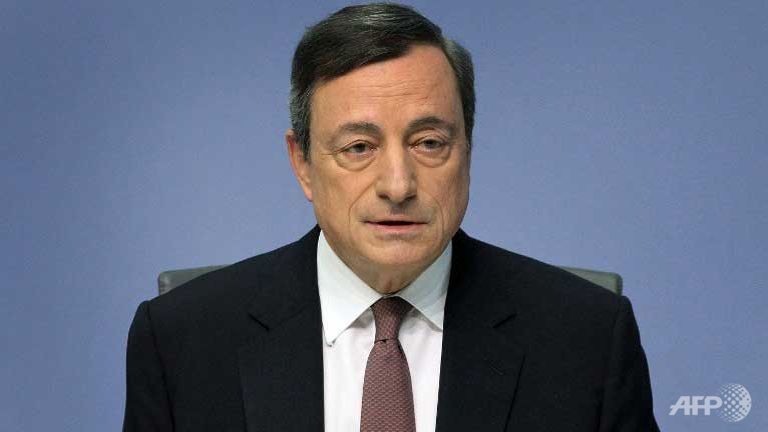ECB dismisses German criticism, says policies working
 |
| Mario Draghi, President of the European Central Bank (ECB), addresses the media during a press conference following the meeting of the Governing Council at the ECB's headquarters in Frankfurt/Main, Germany. (DANIEL ROLAND/AFP) |
FRANKFURT: The European Central Bank on Thursday (Apr 21) dismissed German criticism of its monetary policy, insisting its benefits would take time to unfold, while bank chief Mario Draghi also said Britain's membership in the EU was "mutually beneficial."
"Let me say unequivocally that we view the participation of the UK to the European Union as mutually beneficial and we will continue to say so in the coming weeks," Draghi told a news conference. Would a Brexit "endanger the economic recovery of the euro area? The assessment of our staff is that the risk of this happening is limited," he added.
Turning to the ECB's policies, which have come under fire in Germany recently for hurting savers and banks, Draghi insisted that "our policies work, they're effective. Just give them time to fully display their effects."
And he turned the tables on the politicians, saying that "with the rare exceptions, our policies have been the only policy in the last four years to support growth".
At its previous meeting on Mar 10, the ECB had announced a new range of new policy moves aimed at driving chronically weak inflation in the euro area back up to economically healthier levels.
These included cutting interest rates to zero percent, beefing up its controversial asset purchase programme known as quantitative easing and making vast amounts of cheap loans available to banks.
But the measures have come under increasing fire in Germany, where the country's many savers are seeing interest income cut due to low rates, and banks' profits are being squeezed.
German Finance Minister Wolfgang Schaeuble even recently suggested that the ECB's policies were helping foment political unrest in Germany and aiding the rise of an anti-euro, anti-immigrant party, the AfD.
Draghi dismissed such criticism, insisting that the ECB was legally independent from any meddling from politicians.
ECB 'OBEYS LAW, NOT POLITICIANS'
"We have a mandate to pursue price stability for the whole of the eurozone and not only for Germany alone," Draghi said. "We obey the law, not the politicians because we're independent."
And he threw back the ball into the politicians' court, urging them to pull their weight to help get the eurozone economy back on its feet.
"In order to reap the full benefits from our monetary policy measures, other policy areas must contribute much more decisively, both at the national and at the European levels," Draghi said.
Nevertheless, Draghi left no doubt that the ECB could further ease monetary conditions in the single currency area if it felt the need to.
READY TO ACT
"The governing council will continue to monitor closely the evolution of the outlook for price stability and, if warranted to achieve its objective, will act by using all the instruments available within its mandate," he said.
At Thursday's meeting, the bank's policy-setting governing council voted to leave interest rates at their current all-time lows.
Despite the ECB's latest round of rate cuts last month, eurozone inflation was stuck at zero per cent in March, a long way off from the 2.0 per cent the ECB estimates is conducive to healthy economic growth.
Analysts said the ECB was now in wait-and-see mode. "While keeping its options open today, the ECB is clearly waiting to see the impact of last month's policy measures before reassessing the policy stance," said Berenberg Bank economist Kallum Pickering.
Commerzbank economist Joerg Kraemer predicted the bank would "take a further step towards the end of the year, either by raising the volume of monthly bond purchases" or extending the programme beyond March 2017.
Natixis economist Johannes Gareis said that "while Draghi was cautious about further rate cuts, we do not think that they are off the table."
ING DiBa economist Carsten Brzeski also felt the ECB was keeping the door open for additional stimulus measures in the future.
"The ECB is still on high alert and would be willing to implement even more stimulus if the recovery falters or low inflation leads to negative second round effects," he said.
Furthermore, "the ECB does not look willing at all to alter its monetary policies as a result of German criticism," Brzeski added.
What the stars mean:
★ Poor ★ ★ Promising ★★★ Good ★★★★ Very good ★★★★★ Exceptional
Latest News
More News
- Russian President congratulates Vietnamese Party leader during phone talks (January 25, 2026 | 09:58)
- Worldwide congratulations underscore confidence in Vietnam’s 14th Party Congress (January 23, 2026 | 09:02)
- Political parties, organisations, int’l friends send congratulations to 14th National Party Congress (January 22, 2026 | 09:33)
- 14th National Party Congress: Japanese media highlight Vietnam’s growth targets (January 21, 2026 | 09:46)
- 14th National Party Congress: Driving force for Vietnam to continue renewal, innovation, breakthroughs (January 21, 2026 | 09:42)
- Vietnam remains spiritual support for progressive forces: Colombian party leader (January 21, 2026 | 08:00)
- Int'l media provides large coverage of 14th National Party Congress's first working day (January 20, 2026 | 09:09)
- Vietnamese firms win top honours at ASEAN Digital Awards (January 16, 2026 | 16:45)
- ASEAN Digital Ministers' Meeting opens in Hanoi (January 15, 2026 | 15:33)
- ASEAN economies move up the global chip value chain (December 09, 2025 | 13:32)
















 Mobile Version
Mobile Version